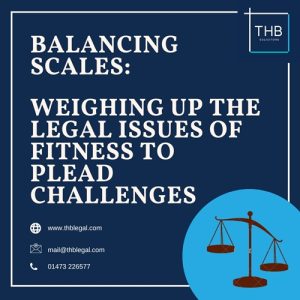Inheritance tax is changing in 2026
What farming families and business owners need to know If you own a farm,...- 11 February 2026
Posted: 29 January 2024
The concept of fitness to plead refers to the ability of a defendant to understand and participate fully in the legal proceedings against them. This can be applicable to those with a mental disorder, a learning difficulty or disability, an acquired or traumatic brain injury, autism spectrum disorder and dementia. It is paramount for both legal practitioners and any individuals concerned to understand this concept. As well as understanding the complexities surrounding it in order to get the most suitable and fair outcome.

The first step in dealing with fitness to plead issues is establishing whether the defendant has capacity to comprehend the course of proceedings and the allegations which they face. An assessment from two psychiatric experts is needed to determine if the defendant can:
For matters in the Crown Court, the defendant’s fitness to plead is determined by the Judge who bases their decision on the evaluations by the psychiatric experts. If the defendant is deemed not fit to plead, a fact-finding hearing takes place to determine whether they committed the alleged offence.
If a defendant is found to have committed the offence, the court is very limited as to what options they have as the usual sentencing options are not appropriate. If found to have done the act the sentencing options are:
A hospital order under section 37 of the Mental Health Act 1983 can be imposed in both the Magistrates and Crown Court on conviction for any imprisonable offence. Accompanied by, when a fact-finding trial has determined that the defendant has committed the alleged act.
A supervision order is available as a means of sentencing for the Crown Court to enable treatment to be given to the defendant. It is intended as a framework for care to be provided and supervised by a social worker or a probation officer.
Section 5 of the Criminal Procedure Act 1964 enables a person who is unfit to plead to be made subject to an absolute discharge following conviction.
This is applicable when a section 37 or 41 hospital order has been made. The decision on whether to resume prosecuting a defendant who has previously been found unfit to plead but becomes fit to enter a plea and stand trial rests solely with the Crown Prosecution Service. The CPS are obliged to review such cases and take into particular regard the seriousness of the offence. Plus, the views of the victims and witnesses and the current availability of evidence. The CPS are not limited to just these considerations, they may seek an opinion from the responsible clinician to inform the decision to resume the prosecution. If the CPS decide to proceed, then the case will be listed for a mention hearing. This is to clarify additional measures required for the defendant at court and when the section 37 or 41 hospital order is to cease.
At the first hearing the prosecution can either formally offer no evidence or resume prosecution with the defendant required to enter a plea to the allegations.
At THB Solicitors we have many experienced criminal law solicitors with a wealth of knowledge and who would be happy to assist you. Send an email, call 01473 226577 or complete our online form.
- 11 February 2026
- 09 February 2026
- 07 February 2026